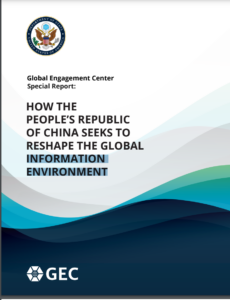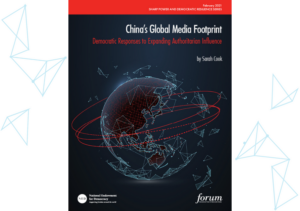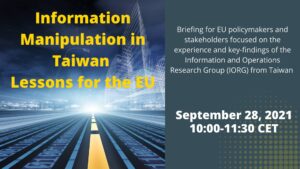 China’s Communist regime employs a variety of deceptive and coercive methods in its efforts to influence the international information environment, according to a new analysis.
China’s Communist regime employs a variety of deceptive and coercive methods in its efforts to influence the international information environment, according to a new analysis.
Beijing’s information manipulation spans the use of propaganda, disinformation, and censorship. Unchecked, the PRC’s efforts will reshape the global information landscape, creating biases and gaps that could even lead nations to make decisions that subordinate their economic and security interests to Beijing’s, says a Special Report from the Global Engagement Center.
Beijing uses false or biased information to promote positive views of the PRC and the Chinese Communist Party (CCP). At the same time, the PRC suppresses critical information that contradicts its desired narratives on issues such as Taiwan, its human rights practices, the South China Sea, its domestic economy, and international economic engagement, notes How the People’s Republic of China Seeks to Reshape the Global Information Environment. More broadly, the PRC seeks to cultivate and uphold a global incentive structure that encourages foreign governments, elites, journalists, and civil society to accept its preferred narratives and avoid criticizing its conduct.
The PRC’s approach to information manipulation includes:
- leveraging propaganda and censorship
- promoting digital authoritarianism
- exploiting international organizations and bilateral partnerships,
- pairing cooptation and pressure, and
- exercising control of Chinese-language media.
 Collectively, these five elements could enable Beijing to reshape the global information environment along multiple axes, the authors add:
Collectively, these five elements could enable Beijing to reshape the global information environment along multiple axes, the authors add:
- Overt and covert influence over content and platforms. Beijing seeks to maximize the reach of biased or false pro-PRC content. It has acquired stakes in foreign media through public and non-public means and sponsored online influencers….
- Constraints on global freedom of expression. On issues it deems sensitive, the PRC has employed online and real-world intimidation to silence dissent and encourage self-censorship…
- An emerging community of digital authoritarians. The PRC promotes digital authoritarianism, which involves the use of digital infrastructure to repress freedom of expression, censor independent news, promote disinformation, and deny other human rights…
In the run-up to Taiwan’s highly competitive presidential and legislative elections in January 2024, China is exploiting doubts voters may have about the United States and its intentions toward Taiwan, as China’s narrative positions Beijing as the keeper of world order in the face of chaos sown by the U.S., RFA reports:
 A report by the Information Operations Research Group, or IORG, that was updated Sunday found 84 examples of China promoting suspicion of the U.S. and its intentions in Taiwan over the past three years. The group believes the Chinese government and its state media are promoting the ideas, such as the U.S. is a fake friend to Taiwan, Washington will abandon Taiwan, and the elite of the two nations are colluding to exploit Taiwan.
A report by the Information Operations Research Group, or IORG, that was updated Sunday found 84 examples of China promoting suspicion of the U.S. and its intentions in Taiwan over the past three years. The group believes the Chinese government and its state media are promoting the ideas, such as the U.S. is a fake friend to Taiwan, Washington will abandon Taiwan, and the elite of the two nations are colluding to exploit Taiwan.
Collectively, the tactics and techniques illuminated in this report hold the potential to reshape the global information environment, but this future is not a foregone conclusion, the GEC report suggests.

National Endowment for Democracy (NED)
When targeting democratic countries, Beijing’s information manipulation efforts have encountered major setbacks, often due to pushback from local media and civil society, it asserts citing research from “Sharp Power: Rising Authoritarian Interference,” an analysis from the National Endowment for Democracy’s International Forum:
There is growing consensus on the need to counter the PRC’s problematic behavior in the information space. A broad range of countries have expressed growing concern about the PRC’s continued amplification of pro-Kremlin propaganda and disinformation on Russia’s full-scale war against Ukraine. The stakes are high: if the PRC’s global narratives ultimately prevail, it will encounter less resistance to reshaping the international order to the detriment of individual liberties and national sovereignty around the world. RTWT







